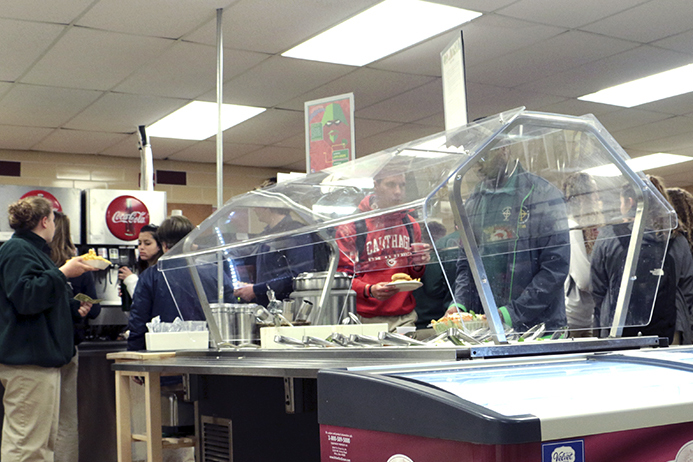Vegan options available in school cafeteria
Food service intern offers advice
The cafeteria has added vegan options to most daily lunch menus.
Veganism is the practice of abstaining from animal products, particularly in diet. As plant-based diets rise in popularity, especially among young people, the school reacts in a particular way.
Senior Lilli Moffatt is an example of a student who is vegan. Moffatt has been vegan for four years. She said, “I chose to become vegan after I educated myself about the environmental impacts of animal products and I also found out about the treatment of animals in commercial slaughterhouses.”
Moffatt said that the shift in her diet can be difficult at times. “It’s a lot harder to not eat dairy and eggs,” she said. “I always ate meat, but never a lot, so that wasn’t very hard to adjust to, but it definitely took me a long time to figure out what I could and couldn’t eat.”
As someone with a restricted diet, Moffatt has to be on the lookout for options that adhere to her parameters. Sometimes that can be difficult. Moffatt said, “It definitely depends on where you go. If you go to a chain restaurant, a lot of the time they have a allergen menus and you just look for if (the meal) has eggs or dairy in it. If you’re going to a locally owned or a nicer restaurant you can ask the server for ingredients.”
Moffatt said that she usually doesn’t encounter many problems. “Nowadays, I feel like people are a lot more accommodated to the word vegan. You just have to ask questions and not be afraid to bother people,” she said.
Options in the cafeteria
However, the cafeteria is a place without many vegan options. Moffatt says she doesn’t buy her lunch there for that reason. She said, “I go to the cafeteria with my friends sometimes and I see that they have soy milk and fruits and bagels and stuff like that and that’s really nice, but I don’t think they have enough variety for people who want to eat a substantial lunch.”
According to dietetic intern Ms. Alexa Farrar, there are sometimes vegan meals on the menu, such as the vegetarian nachos served on Monday. Farrar said, “(The cafeteria) does offer vegan options when they can, and we are always open to new ideas.”
However, Farrar said that offering vegan options in the cafeteria is difficult because few people buy the vegan meals when they’re offered.
In addition to the occasional meals, some of the food that is always available in the cafeteria is vegan, according to Farrar. She said, “The fruit obviously is vegan, along with most of the salad bar options.”
Veganism the right way
Farrar said that it is important for each individual to know how to eat the right way on a vegan diet. She said, “Veganism removes a lot of food groups such as dairy, meat and eggs, so vegans are going to be missing a lot of sources of nutrients. It’s important for them to eat a really wide variety of fruits and vegetables and to make sure they keep track of that. For example, we get most of our calcium from milk and dairy. You can get a lot of calcium from leafy greens and other beans, but you don’t get as much and it’s a little harder for our body to process. Vegans have to eat more calcium overall than someone who eats dairy.”
Another major nutrient source that can be difficult for vegans to acquire is protein. Farrar said, “Animal protein is what we call complete; it has all the amino acids that we need. Beans and grains also provide protein, but they’re missing some of those amino acids. So it’s really important to pair legumes and grains, because when you eat them together, you get all those amino acids that you need.
“One other thing that vegans have to be really careful of is getting enough B12. B12 is really only found in animal protein, so vegans usually have to supplement with a pill.”
Farrar said that she wants to educate vegan students so that they can be healthier. She said, “You can eat a very healthy diet when you’re vegan, it’s just a lot harder because you’re missing a lot of food sources. So you have to do it right, and then it’s super healthy.”
Pros and cons
Moffatt doesn’t think there are many cons to veganism. She said, “(My diet) doesn’t really restrict me from eating good things. There are definitely alternatives for pretty much everything. It does take a minute to figure out what the best recipe for everything is, but as long as you like experimenting with cooking it’s pretty fun.”
For Moffatt, the advantages of veganism outweigh any disadvantages. She said, “I feel like I’m doing something that goes with my ethics. I feel a strong responsibility to take care of the earth, so I feel like I’m really benefitting the planet because of my diet and I want other people to do the same thing.”







